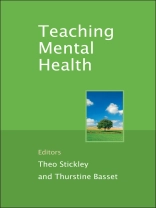Teaching Mental Health
This essential inter-professional volume is aimed at those teaching or training the mental health workforce of the future.
Teaching Mental Health provides a contemporary ‚real-life‘ perspective for those involved in the designing, planning and delivery of mental health education, as well as providing up-to-date information on a wide variety of teaching approaches.
One of the first of its kind, this work aims to help those struggling to fulfil all that is required by the contemporary policy agenda by combining holistic advice with grounded educational theory and practical illustration. This innovative book successfully bridges the training gaps between health and social care institutions, higher education and the voluntary sector by presenting a range of psychologically informed approaches, including:
* Learning from service users
* Reflective practice
* E-learning
* Enquiry, problem-based and work-based learning
* Emotional intelligence
* Learning about social inclusion and recovery
This volume is a valuable resource for a broad range of reader. Lecturers, trainers, workforce developers, human resources personnel, mental health nurses, social workers, psychologists, psychiatrists, occupational therapists, independent training companies and practitioners will all find Teaching Mental Health vital reading.
Inhaltsverzeichnis
About the Editors.
Contributors.
Preface.
1 Setting the Scene.
Theo Stickley and Thurstine Basset.
Part I Learning from one another.
2 Making Waves in Nurse Education: The PINE project.
Sharon Roberts, Ron Collier, Becky Shaw and Joan Cook.
3 Learning from Experience: The CAPITAL Project.
Clare Ockwell.
4 The highs and lows of service user involvement.
Rachel Nickeas.
5 ‚I am the Visual Aid‘: A teacher who is also aservice user, not a service user who used to be a teacher.
Allan Foreman and Alan Pringle.
6 The evolving minds experience: Using video for positivechange, education and empowerment.
Melissa Gunasena.
7 Personal perspectives on mental health problems: anintroduction in the medical undergraduate curriculum
Jacqueline Atkinson.
8 Consumer involvement: Collaborative working in post basicmental health education.
Jayne Breeze and Julie Repper.
9 The Ten Essential Shared Capabilities – theirdevelopment and application.
Ian Baguley, Thurstine Basset and Peter Lindley.
10 Educators learning together: Linking communities ofpractice.
Jill Anderson and Hilary Burgess.
11 Interprofessional action research: loosening bricks in themodernist’s walls.
William Spence.
Part II Key Topics in mental health education.
12 Values-based practice in teaching and learning.
Bill Fulford and Kim Woodbridge.
13 Emotional intelligence in mental health education.
Dawn Freshwater and Theo Stickley.
14 Teaching recovery to the Support Time and Recoveryworkers.
Esther Cooke.
15 Towards social inclusion.
Peter Bates.
16 Race Equality & Cultural Capability.
Peter Ferns.
17 Psychosocial Interventions: Implementation in Practice.
Lorraine Rayner, Norman Young and Madeline O’Carroll.
18 Exploring practitioners‘ relationships with thepharmaceutical industry.
Neil Carver and Russell Ashmore.
Part III A variety of approaches.
19 Revisiting Psychosis (a two-day workshop).
Mark Hayward, Alison Blank, Philip Houghton and Becky Shaw.
20 Developing Problem-based Learning for a Pre-registration Mental Health Nursing Programme.
Carol Cooper and Sue Gunstone.
21 Using Problem-based Learning in Mental Health Nurse Education.
Paul Bickerstaffe, Ben Hannigan, Steve Wood and Norman Young.
22 Teaching and Learning Reflective Practice.
Dawn Freshwater.
23 The buzzing, blooming confusion of clinical practice:Preparing mental health nurses to generate knowledge within, fromand for practice.
Liam Mac Gabhann and Chris Stevenson.
24 Enquiry-Based Learning and Service User Involvement.
Janet H Barker and Brenda Rush.
25 Promoting emotional development through using drama in mentalhealth education.
Yolanda Wasylko and Theo Stickley.
26 Work-based Learning: a model for the future.
Alan Beadsmoore and Thurstine Basset.
27 Information Technology (from the classroom to theworkplace).
Paul Linsley.
28 Therapy training online- using the internet to widen accessto training in mental health issues.
Chris Blackmore, Emmy van Deurzen, Digby Tantam.
29 Teaching and Learning in the future.
Theo Stickley and Thurstine Basset.
Index.
Über den Autor
Contributors
Jill Anderson
Russell Ashmore
Jacqueline Atkinson
Ian Baguley
Janet H. Barker
Thurstine Basset
Peter Bates
Alan Beadsmore
Paul Bickerstaffe
Chris Blackmore
Alison Blank
Jayne Breeze
Hilary Burgess
Neil Carver
Ron Collier
Esther Cook
Joan Cook
Carol Cooper
Emmy van Deurzen
Peter Ferns
Allan Foreman
Dawn Freshwater
Bill Fulford
Melissa Gunasena
Sue Gunstone
Ben Hannigan
Mark Hayward
Philip Houghton
Peter Lindley
Paul Linsley
Liam Mac Gabhann
Rachel Nickeas
Madeline O’Carroll
Clare Ockwell
Alan Pringle
Lorraine Rayner
Julie Repper
Sharon Roberts
Brenda Rush
Becky Shaw
William Spence
Chris Stevenson
Theo Stickley
Digby Tantam
Yolanda Wasylko
Steve Wood
Kim Woodbridge
Norman Young












